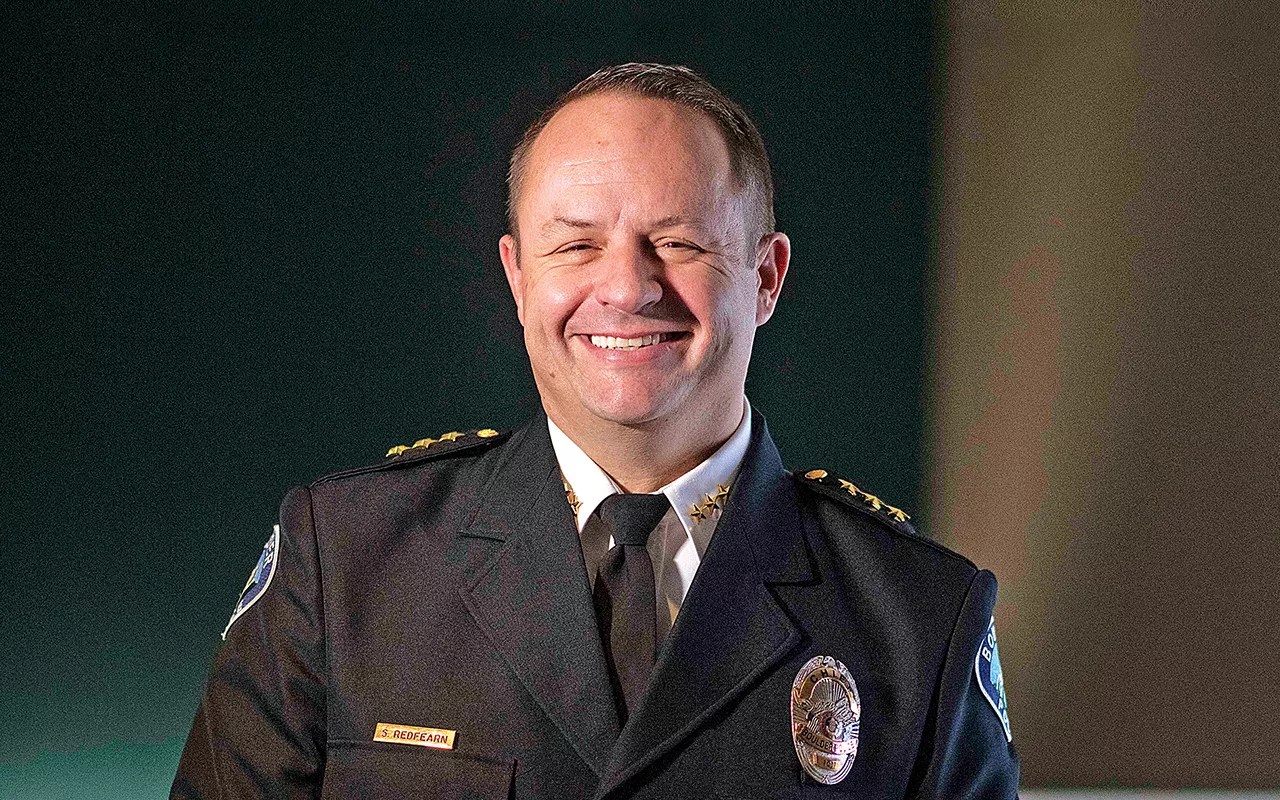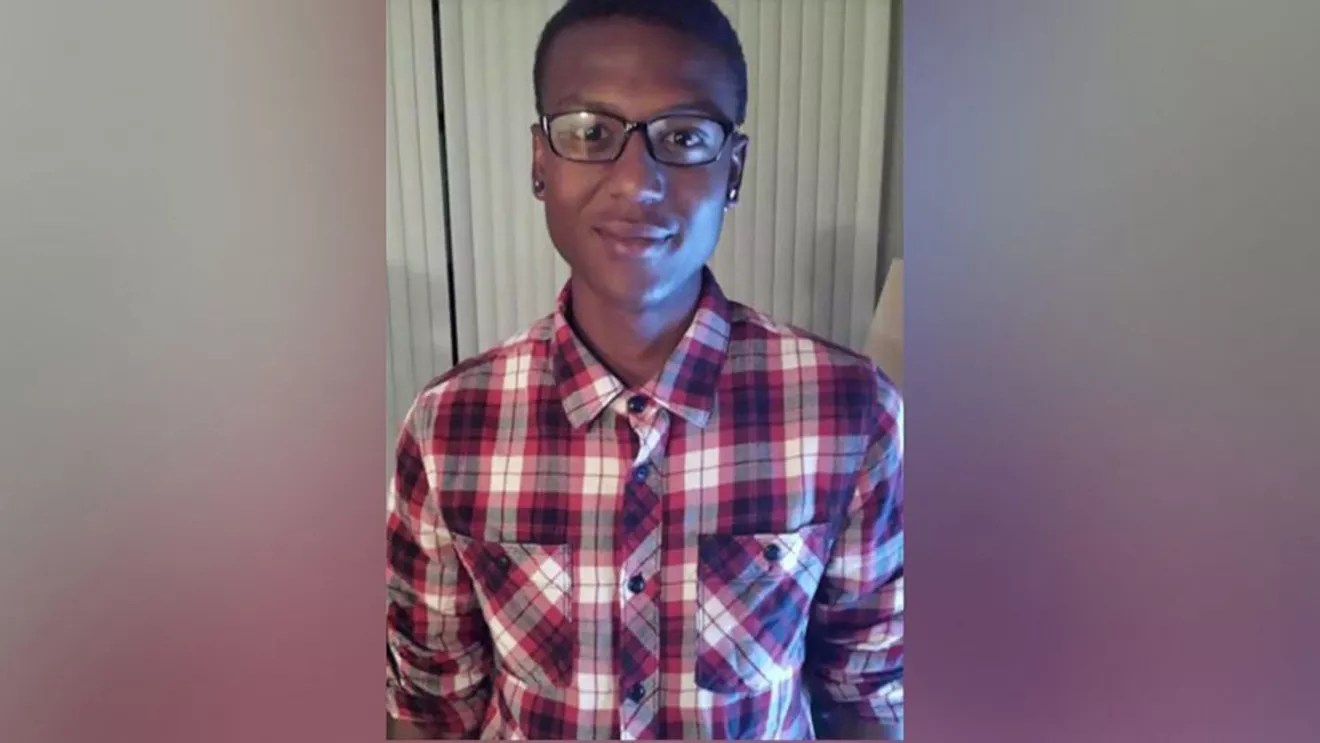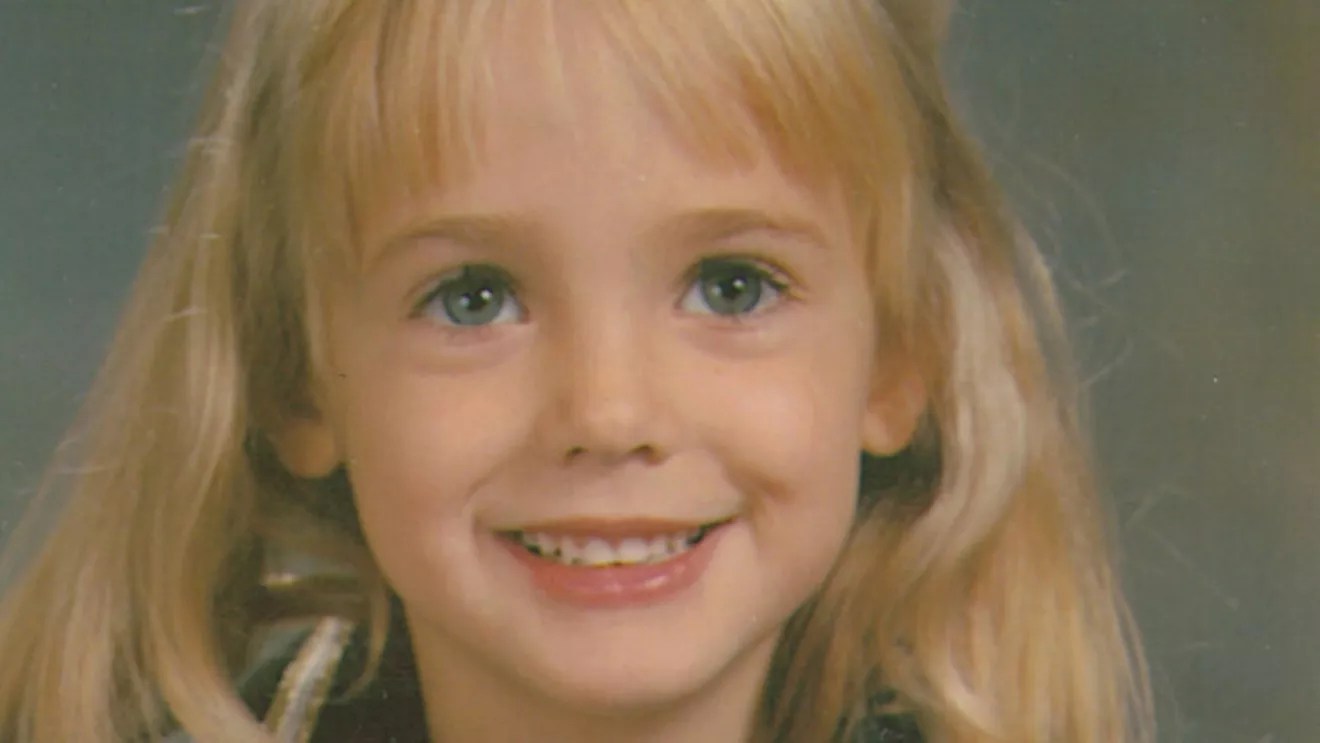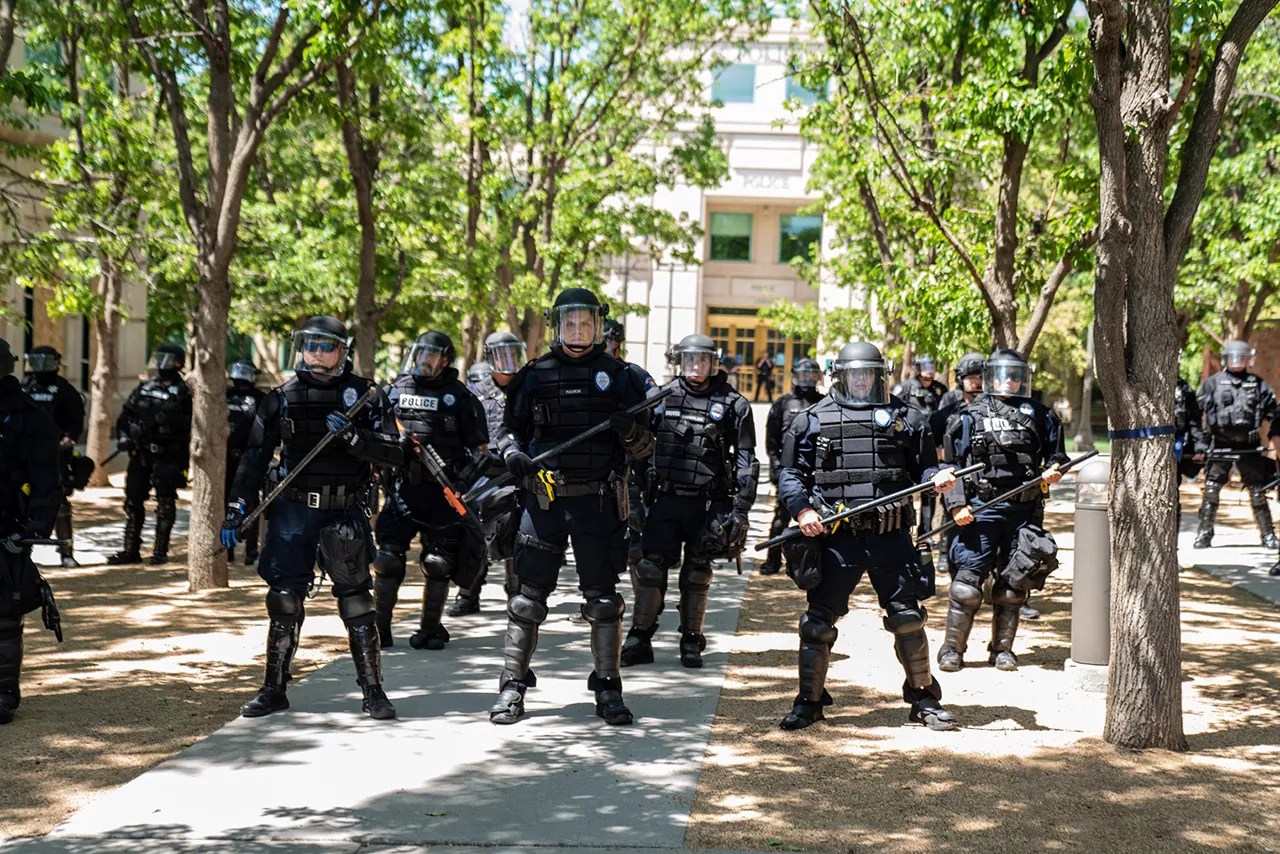
Evan Semón

Audio By Carbonatix
Stephen Redfearn, Boulder’s new interim police chief, says he’s a “big boy” with “thick skin” who can take public criticism about his past. “I don’t think you can sit in this chair and not,” he adds.
The Boulder Police Department’s top cop is human, though, and well aware of the shadow of Elijah McClain that follows him. Even his mother has heard the dark accusations.
“She saw some of the coverage and got really upset,” Redfearn says, noting how one group in particular – the NAACP of Boulder County – has accused him of “covering up” the Aurora Police Department’s role in McClain’s death.
After Redfearn started his new gig in Boulder last month, the NAACP chapter renewed its call for the former APD division chief’s resignation, citing his testimony at two of last fall’s trials of Aurora police officers for McClain’s death, when he admitted that he’d changed the description on the original Computer Aided Dispatch call from “suspicious person” to “assault on an officer.”
“It’s really taken me aback,” Redfearn says of the criticism over his actions that day in late August 2019 when McClain, a young Black man, was given a lethal dose of ketamine by paramedics after a violent encounter with APD officers during which he was forcibly detained and put in a neck hold for being a “suspicious” person.
“What I would say is, give me a chance,” Redfearn says, adding that he’d like to meet with the NAACP and Boulder’s Black community both as a human and a police leader. He’d like to “really make an effort to go out in the community and say, ‘Ask me whatever questions you want about any of that.’

Elijah McClain was accosted by Aurora Police officers in August 2019.
McClain Family Photo
“I have had people that I’ve met since some of these stories came out, and they’re like, ‘Man, the way that this story made you sound is not at all what I’m finding out about you,'” he says.
The more people find out about Redfearn – including his sexuality – the more likely they are to give him that chance.
“It’s nothing I hide, but it tends to break down walls a little bit,” Redfearn says of being an openly gay police chief. “This is a traditionally male-dominated field – and a straight, typically white male-dominated field. In different parts of the country, it’s different.”
His sexuality makes him feel like he can come to a public conversation “with a little bit more of an understanding of what it feels like to be treated differently,” he says.
“Obviously, I can’t understand what it would be like to be a person of color,” Redfearn tells Westword. “But I can understand what it feels like to be treated differently based upon some personal characteristic. So I think that helps me in a way where I may walk into a meeting in a public place and people don’t know my background, my personal story. Once I have those conversations, it tends to break down walls a little bit because people are like, ‘Okay, you probably understand more than somebody that doesn’t have the more diverse background.’ So for me, it just allows me to understand what it’s like to not be treated equally based on a criterion.”
Redfearn, who took over as interim chief on January 22, adds, “There’s places right now and parts of this country where there’s no way you’re going to find an openly gay police chief. So I feel good about where I’m from, and to represent something that just doesn’t exist in a lot of people’s lives.”
He feels good about where he is now, too. But it’s ultimately up to the City of Boulder and City Manager Nuria Rivera-Vandermyde whether Redfearn gets to stay on as the permanent police chief.
“I hope that I do a good enough job that when the time comes for her to decide on someone, I’m a good contender,” Redfearn says. “I would love to stay here and continue all the good work we’re doing.”
Problem-Solving Policing
The longtime cop, who grew up in unincorporated Jefferson County near Chatfield Reservoir, got his start in policing as a cadet for the Jefferson County Sheriff’s Office. “My dad owned his own business, and I thought that I would likely fall into that,” Redfearn says, referring to his father’s work as a manufacturer’s representative focused mainly on housewares and gift items.
But at “about fifteen years old, I did a ride-along with a neighbor who was a deputy in Jefferson County, and I spent the shift with her,” Redfearn remembers. “I was hooked.”
Redfearn started out as a 911 dispatcher with JCSO and stayed with the sheriff’s office for two years before joining the Aurora Police Department in November 1999. “I was lucky to know early on I wanted to be in law enforcement,” he says in a video titled “Get to know BPD Interim Chief Stephen Redfearn,” which the department posted online ahead of his first week.
Redfearn spent more than two decades with the APD, rising through its ranks from patrol officer to division chief. In 2006, he started his supervisory role as a patrol sergeant, and went on to oversee the Field Training Program, Vice and Narcotics Unit, the East Metro Auto Theft Team, Major Investigations Section, Homicide, and several investigative units.
He faced plenty of challenges along the way. When Redfearn started with the APD, it had roughly 700 cops on the force, and he thought he was “the only very closeted gay man,” he recalls.
“I kind of got outed in a way that wasn’t the way I wanted it to be,” he explains. “It wasn’t on my terms, but it was actually the best thing that ever happened. I initially thought, ‘You know what, I love this profession, I want to be a cop. It’s what I want to do. My personal life will stay my personal life.’ But that’s not sustainable, nor is it a healthy way to come in and hide things. Most of the guys that I worked with and have been through a lot of crazy stuff with were like, ‘We kind of knew anyway. It’s totally cool.’ So I had a really good experience.”
Redfearn adds, “I think it’s made me stronger, it’s made me more resilient to be able to get to the seat where, you know, even fifteen years ago, wouldn’t have been possible.”
Still, by 2021, he was thinking of retiring and stepping away from the drama-filled life of a police officer in a major city. That’s when he was contacted about an open position in Boulder, which made him think again. “I was contacted by a recruiter who was running Boulder Police’s deputy chief search, and this recruiter recommended I put in for the position,” he recalls. “I did my research and put in for it.”
Going from a big department like the APD, which has 748 officers, to a calmer and less action-filled setting like Boulder, which has roughly 200 officers, was a deciding factor.
“I was not leaving to run away from anything,” Redfearn says. “There’s people saying I left because I was in trouble, that I had some strange agreement in exchange for my testimony. That’s all blasphemy. I retired in good standing. I retired as if I was going to go ride off into the sunset. I could have gone and worked at Starbucks.”
Redfearn was enjoying his work in Boulder when then-BPD Chief Maris Herold said she would be leaving for a job at the Department of Justice’s Law Enforcement Knowledge Lab. Redfearn was tapped to take over as interim chief, and that included pushing the projects that Herold had started.

JonBenét Ramsey was murdered 27 years ago.
Courtesy of the Ramsey Family
One was a renewed look at the JonBenét Ramsey murder case, which Herold had sent to Colorado’s Cold Case Review Team for a year-long study.
Late last year, John Ramsey, the dead girl’s father, told Westword that he was heading into 2024 with more hope than ever before that authorities would be able to finally find the person who’d killed six-year-old JonBenét at their home in Boulder more than 27 years ago. But when Herold announced her departure, Ramsey said he worried that “it could be a setback.”
Redfearn plans to push forward, however. “As with any cold case, we are going to work this case until we identify a suspect. We will always work any leads that we have,” he says.
“The cold case review was extremely thorough,” he continues. “We had a lot of really smart people in the room, and I think out of that we have a bunch of action items now that we’re going to be working with partners on. And so, while the case is a very old case, we’re still working it, and we will continue to work it as long as we have things we can work.”
And that will happen “regardless of who’s sitting in [the chief’s] chair,” Redfearn says. “That’s the commitment we made to the family and to the community, and nothing’s going to change. It’s always at the forefront of our minds. It’s a horrible tragedy, and we’d love nothing more than to solve the case. So we’re going to continue to work it as long as we can, and as long as we have workable leads, we’re going to follow those wherever they go.”
But while Herold left him with some old business, the BPD also has some new projects, too, including a policing plan that Herold introduced last September.
Backed by the Obama Foundation, the BPD’s new Reimagine Policing Plan is designed to help police departments address “use-of-force policies and/or ways to redefine public safety and combat systemic racism within law enforcement,” the foundation says on its website.
“The plan advances a progressive, community-based policing approach known as Problem-Solving Policing, and is implemented through an organizational structure model known as Stratified Policing,” the City of Boulder says. It’s carried out using a “60-40” method, with cops instructed to spend 60 percent of their shift responding to calls for service and 40 percent of it on “holistic problem-solving” and crime prevention.
“Our plan is to prevent that crime from even happening in the first place. And a big part of this is it’s location-based.”
“What this does is, we look at where do we go the most and why,” Redfearn explains. “Normally, there’s issues like poor place management – where a business owner is doing things like selling single cigarettes or selling single cans of alcohol – or it’s, ‘Why does this apartment building have a lot more calls?’ And it’s typically someone’s not managing it properly. And then we work with them to figure out how to stop and how we can reduce those calls. Our plan is to prevent that crime from even happening in the first place. And a big part of this is it’s location-based.”
The plan calls for officers to get out to those locations. “We’re always trying to figure out ways to get out in the community, and it’s usually really well received,” Redfearn adds.
“That’s the way to build trust, in my opinion. And also just being professional. When we make a mistake, own it – be transparent. All of those things will build trust to show how when something bad happens in the community, we can recover. Like something where, ‘I’m mad that this happened but I really appreciate how transparent the police department was.’ That doesn’t happen overnight. I feel like we have a good amount of community trust already. It’s just a matter of once you have it, you also have to maintain it.”
The McClain Shadow
Policing across the country lost a lot of community trust in 2020, after the murder of George Floyd at the hands of a Minneapolis police officer. That incident focused attention on other cases around the country, including Aurora.
Colorado’s third-largest city had a storied history when it comes to problems within its police department, with over ten police-brutality cases settled between 2003 and 2018 for a total of $4.6 million, according to the ACLU of Colorado.
A 2021 investigation by the Colorado Department of Law found that the APD has shown “a pattern and practice of violating state and federal law through racially biased policing, using excessive force, and failing to record legally required information when interacting with the community,” the DOL reported.
But nothing in Aurora attracted as much attention as Elijah McClain’s death.
Redfearn was on duty on August 24, 2019, a senior command officer and captain. That night, a call had come in to 911 about a Black man wearing a mask who was acting suspicious. It was 23-year-old McClain, returning home from a convenience store where he’d bought some iced tea.
When police arrived in response to the call, the situation quickly escalated.
As Redfearn pulled up to the scene on Billings Street, an ambulance was “pulling away,” he says. McClain was in the ambulance, unconscious. He was taken off life support five days later.
“I got to the scene, and once I learned what happened I’m like, ‘All right, hold on, we’ve got to treat this like a critical incident,” Redfearn recalls. “Detectives came out, officers got a chance to do interviews, crime scenes got processed, all the things that needed to happen happened. I never thought down the road that, you know, that would lead to officers being charged, because I had no reason to doubt those officers. I’d never had any bad interactions with them before.”
Although the officers were originally absolved of any culpability by the then-District Attorney Dave Young, over the next year, calls for a renewed investigation increased. Ultimately, Governor Jared Polis asked Colorado Attorney General Phil Weiser to look into the case, and three police officers as well as two paramedics wound up charged in connection with his death.
While two police officers – Nathan Woodyard and Jason Rosenblatt – were found not guilty, former APD cop Randy Roedema was convicted of criminally negligent homicide and third-degree assault and sentenced to fourteen months in jail and four years of probation. Aurora Fire Rescue paramedics Jeremy Cooper and Peter Cuchuniec were also found guilty of criminally negligent homicide and are scheduled to be sentenced on March 1.
Redfearn testified at the cops’ trial and received renewed scrutiny after his testimony.
He told jurors that after speaking to officers on the scene, he changed the characterization of the emergency call because one of the cops claimed McClain attempted to grab his gun. “That was something that we were truly focused on trying to have the right data,” he explains. “And I used the example when I testified in the trial, so let’s say we get a call of domestic violence and we get there and learn that it’s not. Do we want that call staying as a domestic violence call? Or do we want to clarify it for what it really is? Or you go on a call for a welfare check and it turns out to be a homicide?”
“I got to the scene, and once I learned what happened I’m like, ‘All right, hold on, we’ve got to treat this like a critical incident.”
Redfearn tells Westword he decided to declare McClain’s arrest a critical incident – where a police action results in someone being seriously injured or killed – after learning he was unconscious in the ambulance and possibly deceased, which is standard protocol. He says his changing of the CAD call was also “standard practice” and based on what officers were reporting at the scene about McClain going for one of the cop’s guns, which turned out to not be true.
“It was really just about data integrity,” Redfearn says. “I’m not trying to use that as a cop-out; it’s just the way we’ve always done it. It wouldn’t have been appropriate for me to do some thorough investigation on scene to see if that’s what really happened. Detectives did that.”
His testimony was about integrity, too, he says. “If I hadn’t done that, I don’t think those officers would ever have been charged,” he proclaims, referencing his “critical incident” declaration and CAD call change. “I’m not trying to toot my horn, but I don’t think it was a tough decision. I wasn’t doing it thinking, ‘Yeah, we’re going to do this so we could charge these cops.’ But if we had not done the full critical incident call out…all the things that were set in motion, I don’t think any of those things down the road would have ever happened.”
But while Redfearn continues to believe that he did nothing wrong, the NAACP of Boulder County disagrees. After first urging Herold to let him go, they called on the city to fire its new interim chief because of his role in the case.
“I wasn’t there when it happened, but I will say, in hindsight, I was not thinking of how that might appear down the road to somebody in the community or others that might not know why we do what we do,” Redfearn says. “So it’s been a learning experience in that regard. ‘Just because we can do this – it’s legal, we aren’t doing anything that’s violating policy or law – should we be doing it in that form?’ I’ve been able to think about it from that perspective, and I’ve met with a couple of community members and have had this discussion about, ‘Yeah, it truly appeared something shady was going on.’ Of course, there wasn’t, but I get [the criticism] now, and we’re looking at the way we are doing things on our own here internally on those exact things.”
NAACP Boulder County President Annett James and Vice President Jude Landsman tell Westword they’re looking for more accountability and less dismissiveness from Redfearn. “Truly, it feels like a deflection,” Landsman says of Redfearn’s comments to Westword. “He is not answering to accountability. The underlying attitude of his statements are dismissive. It’s like, ‘Well, I’m sorry, he died. But these people are criticizing me even though I wasn’t there.’ Where is the real accountability?”
Redfearn says he’s not sure how much more accountability he can show.
“I testified for the prosecution, for the attorney general, against those cops, whom I knew. It was not an easy thing to do.”
“I mean, I testified for the prosecution, for the attorney general, against those cops, whom I knew,” he points out. “It was not an easy thing to do. So, yeah, this whole thing with this criticism, it’s just been bizarre. I feel like one thing was plucked out of that entire thing and made into this thing. I’m all about, you know, introspection. And I’ve really looked at that [the call change], to understand why that might not have been the best practice. But I’ll say it very clearly: I had no ill intent, was not covering anything up. In fact, I was doing the exact opposite.”
“It’s outrageous for Stephen Redfern to create himself as a hero,” Landsman responds. “It’s white-washing.”
“Why is he so upset that he would be challenged on this?” wonders James. “To be dismissive that one would care about this enough to think that level of judgment should not be the primary attitude around policing – and certainly, in policing people of color – is arrogant.
“There are plenty of people in the community who understand, intellectually and emotionally, that there’s something amiss here,” she notes. “And we’re the only people who are willing to speak out.”
The NAACP leaders point to another controversial incident involving Redfearn in June 2020, when he was identified as one of several cops involved in a pepper-spray skirmish with people attending a violin vigil for McClain outside the Aurora Municipal Center. Redfearn was accused of using excessive force when he pepper-sprayed three men who were trying to take a nightstick away from an Arapahoe County sheriff’s deputy.
“People should be outraged – continually outraged – at what happened to Elijah McClain. But not only that, [Redfearn] was named and identified as a leader in the assault on the memorial vigil,” Landsman says. “If he felt so bad about Elijah McClain, why did he go out and pepper-spray a bunch of violinists who were trying to honor his memory? He was named as a defendant by multiple plaintiffs, who got a $750,000 settlement.”
Redfearn confirms that he used pepper spray on the individuals, and says he would do so again.
“There were three guys in masks and shields that were not part of the peaceful protest,” Redfearn says. “And I testified to this. … I pepper-sprayed three guys that were trying to take a baton, a nightstick, away from a female Arapahoe County deputy. They were actively trying to disarm her of that. I deployed pepper spray just on those three people. And in fact, there are things I testified to that I specifically put things in place to try and protect the peaceful violin crowd from the agitators, such as these guys, who brought masks and shields and backpacks full of rocks. So once again, as with the [McClain call change], certain entities have taken small pieces of a large event and chosen to spin that in an unfavorable light toward me, and it’s irresponsible.”

Aurora police lined up against protesters demanding justice for Elijah McClain.
Michael Emery Hecker
While Redfearn may claim to have “thick skin,” he admits that it’s tough knowing his first stint as a police chief comes with controversy right out of the gate.
“I just want people to get to know me,” he says. “Don’t base your opinion off me from one thing. We’re doing really good things here, and the last thing I want is some stories about me to detract from that.”
Asked if Redfearn deserves a chance, James asks, “Does Elijah McClain get the chance to be alive again?”
“There are some positions that one gets to have in their lives and to carry a gun with the sanction of the government that you’re at a standard where his mistakes are deadly,” James adds. “Bad judgment at that level changes the course of human history. That’s why we’re so concerned. We want the kind of people who can exercise the kind of deductive reasoning and self-control. And so this is what we’re talking about – a much bigger picture. I hope he will redeem himself. But he can redeem himself as a citizen in some other career path.”
“I’m hoping we can at least meet and have these conversations,” Redfearn says, “even though they may not be pleasant.”